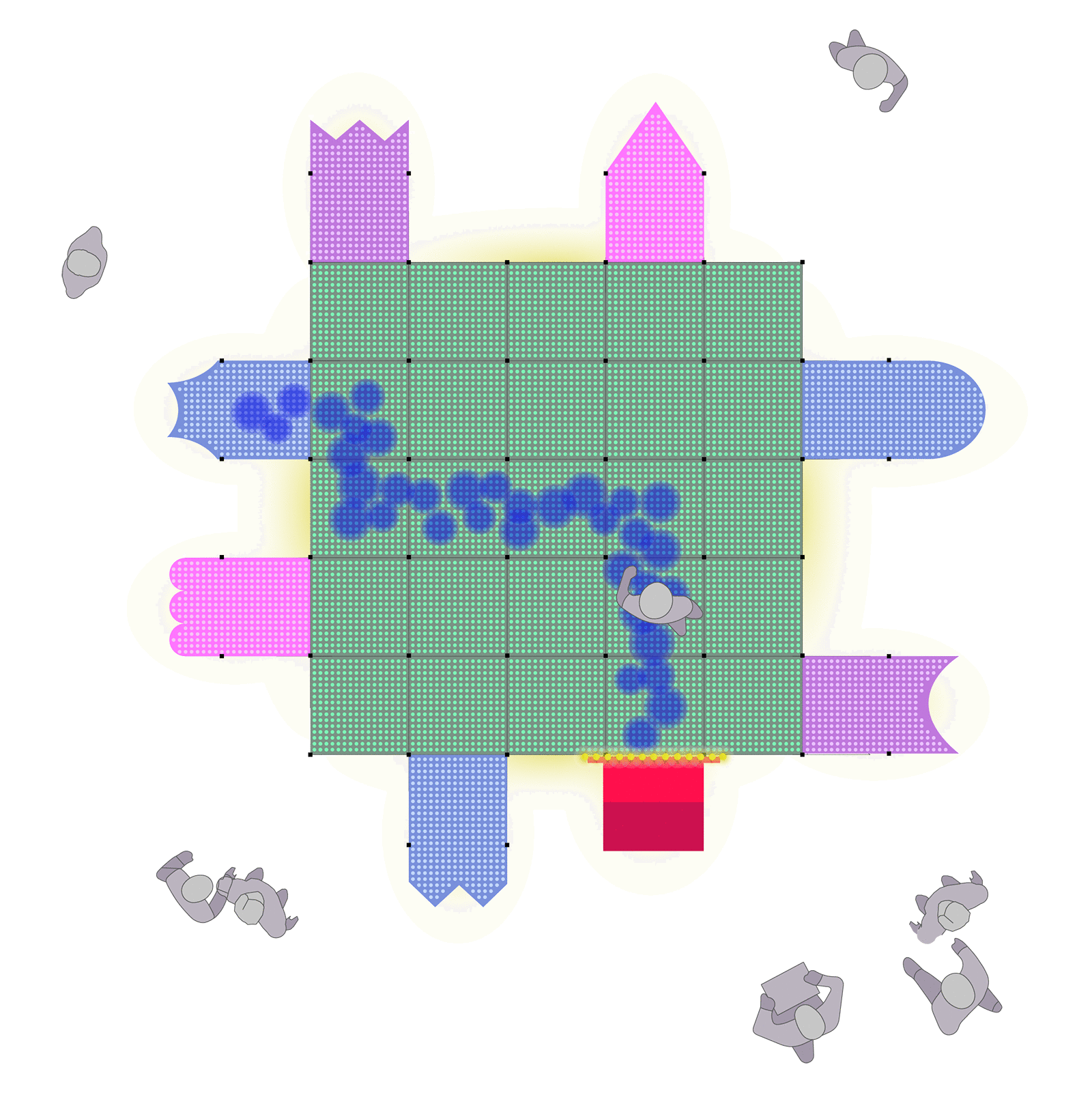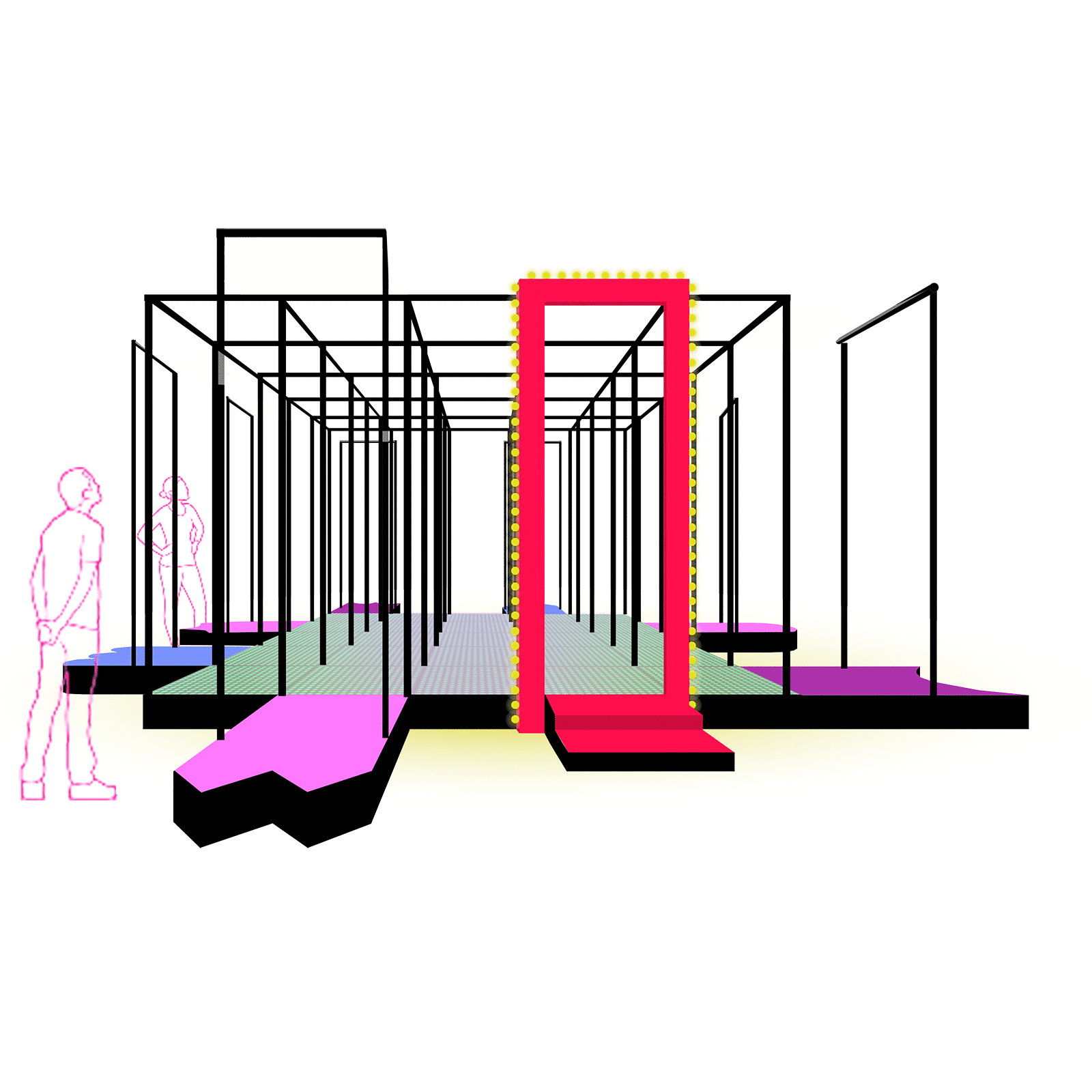TECHNO-LIMITS




ENG
The human being is an explorer. Through this immersive installation, ARLAB offers new insight into the digital technologies that are becoming more and more integrated into our daily environment. Far from leaving our criteria to be charmed up by the inherent propaganda of such technologies, ARLAB raises a cautious message: All technological improvements must be considered with a critical eye. We should rather avoid a path in which new apps take every single one of our decisions: what to watch in the TV, which route to take with the car, which restaurant to pick up tonight. From the beginning, human beings have set out to discover the world, they have gotten on board to understand the universe. With the advent of digital technology, this trend is being reversed. The human being is transformed into a bored, useless and passive player who is studied by the machine, or by the company that produces it. The computer ex- plores us, analyzes us, and draws up avatars of each of us. We experience with the new technologies a transfer of awareness. From now on we are dependent on the machine. By devolving our work toit, our knowledge fades into this virtual Skinner box. Each generation loses a bit more of knowledge (and awareness), to the point of forgetting the wisdom acquired by our elders. The machine-explo- rer does not stop there. We give it access to our habits, our preferences, our GPS position. The ma- chine absorbs all this information. Our identity is translated into a binary code and interpreted by the computer. Marketing actions are omnipresent on our screens and shape us gradually. It satisfies our desires, guides our desires, Google News even selects for us the content we look at. Thus, the ques- tions arises: Is the machine what makes our own choices or shows us what we want to find? Are we still making decisions about our lives or are we delegating our awareness to the machine?
FR
L'être humain est un explorateur. A travers cette installation immersive, ARLAB offre un nouvel éclairage sur les technologies numériques qui s'intègrent de plus en plus dans notre environnement quotidien. Loin de laisser nos critères pour se laisser charmer par la propagande inhérente à ces technologies, ARLAB lance un message prudent : Toutes les améliorations technologiques doivent être considérées avec un œil critique. Nous devrions plutôt éviter une voie dans laquelle les nouvelles applications prennent chacune de nos décisions : ce que nous regardons à la télévision, quel chemin prendre avec la voiture, quel restaurant choisir ce soir. Depuis le début, l'être humain est parti à la découverte du monde, il s'est embarqué pour comprendre l'univers. Avec l'avènement du numérique, cette tendance s'inverse. L'être humain est transformé en un joueur ennuyé, inutile et passif qui est étudié par la machine, ou par l'entreprise qui la produit. L'ordinateur nous explore, nous analyse, et dresse des avatars de chacun d'entre nous. Nous vivons avec les nouvelles technologies un transfert de conscience. Désormais, nous sommes dépendants de la machine. En lui dévoluant notre travail, nos connaissances s'effacent dans cette boîte de Skinner virtuelle. Chaque génération perd un peu plus de savoir (et de conscience), au point d'oublier la sagesse acquise par nos aînés. La machine-exploitante ne s'arrête pas là. Nous lui donnons accès à nos habitudes, nos préférences, notre position GPS. La ma- chine absorbe toutes ces informations. Notre identité est traduite en un code binaire et interprétée par l'ordinateur. Les actions marketing sont omniprésentes sur nos écrans et nous façonnent progressivement. Il satisfait nos désirs, guide nos envies, Google News sélectionne même pour nous le contenu que nous regardons. Ainsi, la ques- tion se pose : Est-ce la machine qui fait nos propres choix ou qui nous montre ce que nous voulons trouver ? Prenons-nous encore des décisions concernant notre vie ou déléguons-nous notre conscience à la machine ?
ABOUT
Location: Lausanne
Status: competition
Collaborations: Romain D’Incau, Rodrigo Triana, Max Kollep
The human being is an explorer. Through this immersive installation, ARLAB offers new insight into the digital technologies that are becoming more and more integrated into our daily environment. Far from leaving our criteria to be charmed up by the inherent propaganda of such technologies, ARLAB raises a cautious message: All technological improvements must be considered with a critical eye. We should rather avoid a path in which new apps take every single one of our decisions: what to watch in the TV, which route to take with the car, which restaurant to pick up tonight. From the beginning, human beings have set out to discover the world, they have gotten on board to understand the universe. With the advent of digital technology, this trend is being reversed. The human being is transformed into a bored, useless and passive player who is studied by the machine, or by the company that produces it. The computer ex- plores us, analyzes us, and draws up avatars of each of us. We experience with the new technologies a transfer of awareness. From now on we are dependent on the machine. By devolving our work toit, our knowledge fades into this virtual Skinner box. Each generation loses a bit more of knowledge (and awareness), to the point of forgetting the wisdom acquired by our elders. The machine-explo- rer does not stop there. We give it access to our habits, our preferences, our GPS position. The ma- chine absorbs all this information. Our identity is translated into a binary code and interpreted by the computer. Marketing actions are omnipresent on our screens and shape us gradually. It satisfies our desires, guides our desires, Google News even selects for us the content we look at. Thus, the ques- tions arises: Is the machine what makes our own choices or shows us what we want to find? Are we still making decisions about our lives or are we delegating our awareness to the machine?
FR
L'être humain est un explorateur. A travers cette installation immersive, ARLAB offre un nouvel éclairage sur les technologies numériques qui s'intègrent de plus en plus dans notre environnement quotidien. Loin de laisser nos critères pour se laisser charmer par la propagande inhérente à ces technologies, ARLAB lance un message prudent : Toutes les améliorations technologiques doivent être considérées avec un œil critique. Nous devrions plutôt éviter une voie dans laquelle les nouvelles applications prennent chacune de nos décisions : ce que nous regardons à la télévision, quel chemin prendre avec la voiture, quel restaurant choisir ce soir. Depuis le début, l'être humain est parti à la découverte du monde, il s'est embarqué pour comprendre l'univers. Avec l'avènement du numérique, cette tendance s'inverse. L'être humain est transformé en un joueur ennuyé, inutile et passif qui est étudié par la machine, ou par l'entreprise qui la produit. L'ordinateur nous explore, nous analyse, et dresse des avatars de chacun d'entre nous. Nous vivons avec les nouvelles technologies un transfert de conscience. Désormais, nous sommes dépendants de la machine. En lui dévoluant notre travail, nos connaissances s'effacent dans cette boîte de Skinner virtuelle. Chaque génération perd un peu plus de savoir (et de conscience), au point d'oublier la sagesse acquise par nos aînés. La machine-exploitante ne s'arrête pas là. Nous lui donnons accès à nos habitudes, nos préférences, notre position GPS. La ma- chine absorbe toutes ces informations. Notre identité est traduite en un code binaire et interprétée par l'ordinateur. Les actions marketing sont omniprésentes sur nos écrans et nous façonnent progressivement. Il satisfait nos désirs, guide nos envies, Google News sélectionne même pour nous le contenu que nous regardons. Ainsi, la ques- tion se pose : Est-ce la machine qui fait nos propres choix ou qui nous montre ce que nous voulons trouver ? Prenons-nous encore des décisions concernant notre vie ou déléguons-nous notre conscience à la machine ?
ABOUT
Location: Lausanne
Status: competition
Collaborations: Romain D’Incau, Rodrigo Triana, Max Kollep